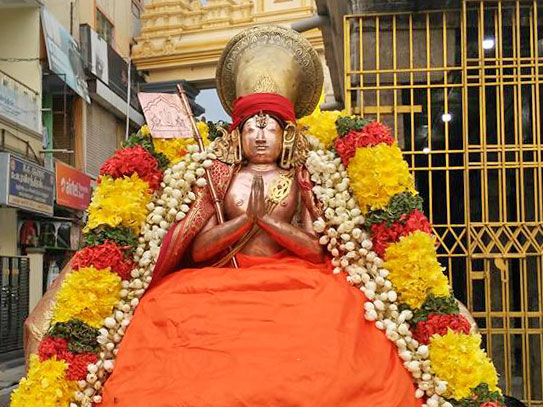KIRTAN ILLUMINATIONS
YOUR MERCIFUL GLANCE
Song 2 from the Yāmuna-bhāvāvalī in Gītā-mālā

To begin his composition Gītā-mālā (‘A Garland of Songs’), Śrīla Bhakti Vinod Ṭhākur composed a series of three verse songs which illuminate the meaning of twenty-seven verses selected from Śrī Yāmuna Āchārya’s Śrī Stotra-ratna, also known as the Ālavandāra-stotra and Ālamandāru-stotra. Śrīla Bhakti Vinod Ṭhākur offered two titles for this initial section of Gītā-mālā: (1) Yāmuna-bhāvāvalī (A series of the sentiments of Śrī Yāmuna Āchārya) and (2) Śānta-dāsya-bhakti-sādhana-lālasā (Longing to engage in bhakti with śānta- and dāsya-rati).
This text is being published as a series with each song presented in the following format:
- The original text of each verse in each song in Bengali script and roman transliteration,
- A verse-ordered word by word gloss of each verse,
- A prose-ordered word by word gloss of each verse,
- A prose translation of each verse.
Preceding each song, the verse from Śrī Stotra-ratna upon which it is based will be presented in Devanagari and roman transliteration and then in the same format as the Bengali verses.
***
Śrī Stotra-ratna: 10
नावेक्षसे यदि ततो भुवनान्यमूनि
नालं प्रभो भवितुमेव कुतः प्रवृत्तिः ।
एवं निसर्गसुहृदि त्वयि सर्व्वजन्तोः
स्वामिन्न चित्रमिदमाश्रितवत्सलत्वम् ॥१०॥
nāvekṣase yadi tato bhuvanāny amūni
nālaṁ prabho bhavitum eva kutaḥ pravṛttiḥ
evaṁ nisarga-suhṛdi tvayi sarva-jantoḥ
svāmin na chitram idam āśrita-vatsalatvam [10]
na avekṣase–You did not glace; yadi–if; tataḥ–then; bhuvanāni–worlds; amūni–these; na alam–would not be able; prabhaḥ–O Lord; bhavitum–to exist; eva kutaḥ–much less; pravṛttiḥ–function; evam–thus; nisarga–natural; suhṛdi–in friend; tvayi–in You; sarva–all; jantoḥ–of living entities; svāmin–O Master; na–not; chitram–surprising; idam–this; āśrita–dependent; vatsalatvam–quality of being affectionate. [10]
yadi–If avekṣase na–did not cast [Your] glance, prabhaḥ–O Lord, tataḥ–then amūni–these bhuvanāni–worlds na alam–would not be able bhavitum–to exist, kutaḥ eva–much less pravṛttiḥ–function. evam–Thus, svāmin–O Master, idam–this vatsalatvam–quality of being affectionate āśrita–to dependents tvayi–in You [the] nisarga–natural suhṛdi–friend [of] sarva–all jantoḥ–living entities [is] na–not chitram–surprising. [10]
If You did not cast Your glance, O Lord, then these worlds could not even exist, much less function. Thus, O Master, this quality in You, the natural friend of all living entities, of being affectionate to Your dependents is not surprising.
***
Yāmuna-bhāvāvalī: 2
হরি হে !
তোমার ঈক্ষণে হয় সকল উত্পত্তি লয়
চতুর্দ্দশ ভুবনেতে যত
জড় জীব আদি করি’ তোমার কৃপায় হরি
লভে জন্ম, আর কব কত ॥১॥
hari he!
tomāra īkṣaṇe haya sakala utpatti laya
chaturdaśa bhuvanete yata
jaḍa jīva ādi kari’ tomāra kṛpāya hari
labhe janma, āra kaba kata [1]
hari–Hari; he!–O; tomāra–Your; īkṣaṇe–by glance; haya–occurs; sakala–all; utpatti–creation; laya–destruction; chaturdaśa–fourteen; bhuvanete–in worlds; yata–all; jaḍa–matter; jīva–living being; ādi kari’–originating; tomāra–Your; kṛpāya–by grace; hari–Hari; janma labhe–takes birth; āra–more; kaba–can I say; kata–how much? [1]
he!–O hari–Hari! [By] tomāra–Your īkṣaṇe–glance, sakala–all utpatti–creation [and] laya–destruction haya–occurs. jaḍa–The matter [and] yata–every jīva–living being [throughout] chaturdaśa–the fourteen bhuvanete–worlds, [by] tomāra–Your kṛpāya–grace, hari–O Hari, ādi kari’–originates [and] janma labhe–takes birth. kata–How much āra–more kaba–can I say? [1]
O Hari! By Your glance everything is created and destroyed. The matter and every jīva throughout the fourteen worlds, by Your grace, O Hari, originates and takes birth. What more can I say?
তাহাদের বৃত্তি যত তোমার ঈক্ষণে স্বতঃ
জন্মে প্রভু তুমি সর্ব্বেশ্বর
সকল জন্তুর তুমি স্বভাবিক নিত্য-স্বামী
সুহৃন্ মিত্র প্রাণের ঈশ্বর ॥২॥
tāhādera vṛtti yata tomāra īkṣaṇe svataḥ
janme prabhu tumi sarveśvara
sakala jantura tumi svabhāvika nitya-svāmī
suhṛn mitra prāṇera īśvara [2]
tāhādera–of their; vṛtti–faculties; yata–all; tomāra–your; īkṣaṇe–by glance; svataḥ–automatically; janme–manifest; prabhu–O Master; tumi–You; sarva–all; īśvara–Lord; sakala–all; jantura–of living being; tumi–You; svabhāvika–natural; nitya–eternal; svāmī–proprietor; suhṛn–well-wishing; mitra–friend; prāṇera–of heart; īśvara–Lord. [2]
yata–All [of] tāhādera–their vṛtti–faculties janme–manifest svataḥ–automatically [by] tomāra–Your īkṣaṇe–glance. prabhu–O Master! tumi–You [are] īśvara–the Lord sarva–of all. tumi–You [are] svabhāvika–the natural nitya–eternal svāmī–proprietor [of] sakala–all jantura–living beings. [You are their] suhṛn–well-wishing mitra–friend [and] īśvara–the Lord prāṇera–of [their] hearts. [2]
All of their faculties manifest automatically by Your glance. O Master! You are the Lord of all. You are the natural eternal proprietor of all living beings. You are their well-wishing friend and the Lord of their hearts.
এ ভক্তিবিনোদ কয় শুন প্রভু দয়াময়
ভক্ত-প্রতি বাত্সল্য তোমার
নৈসর্গিক ধর্ম্ম হয় ঔপাধিক কভু নয়
দাসে দয়া হইয়া উদার ॥৩॥
e bhakti-vinoda kaya śuna prabhu dayāmaya
bhakta-prati vātsalya tomāra
naisargika dharma haya aupādhika kabhu naya
dāse dayā ha-iyā udāra [3]
e–this; bhakt-vinoda–Bhakti Vinod; kaya–says; śuna–please listen; prabhu–O Lord; dayāmaya–merciful; bhakta–devotee; prati–towards; vātsalya–affection; tomāra–Your; naisargika–inherent; dharma–nature; haya–is; aupādhika–conditional; kabhu naya–never; dāse–towards servant; dayā–mercy; ha-iyā–being; udāra–magnanimous. [3]
e–This bhakt-vinoda–Bhakti Vinod kaya–says, śuna–“Please listen, [O] dayāmaya–merciful prabhu– Lord! tomāra–Your vātsalya–affection prati–towards [Your] bhakta–devotees haya–is [Your] naisargika–inherent dharma–nature and [is] kabhu naya–never aupādhika–conditional, [as] dāse–towards [Your] servants [You] ha-iyā–have dayā–mercy [and are] udāra–magnanimous. [3]
This Bhakti Vinod says, “Please listen, O merciful Master! Your affection for Your devotees is Your inherent nature and is never conditional. Towards Your servants You are always merciful and magnanimous.”








